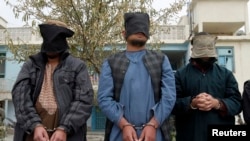ISLAMABAD —
Afghanistan President Hamid Karzai has ordered the release of all but 16 prisoners from a group of 88 detainees that American authorities believe are responsible for murdering scores of coalition and Afghan soldiers.
U.S. political and military leaders describe the prisoners as dangerous criminals responsible for killing American and Afghan troops, and are demanding that Karzai allow Afghan courts to determine their fate.
Karzai's decision is expected to further strain U.S.-Afghan relations as pressure mounts over the delayed signing of a security deal that outlines the U.S. military presence in the country after 2014.
A statement from Karzai's office says a panel reviewed cases against all 88 prisoners considered serious threats. The panel decided 45 of the detainees were innocent, and that evidence against another 27 was insufficient for trial, and ultimately recommended legal proceedings against only the 16 remaining inmates.
There is no word when the prisoners will be allowed to leave the Bagram detention center north of Kabul.
Karzai's announcement came hours after the American commander of international forces in Afghanistan, General Joseph Dunford, spoke to reporters in Kabul to reiterate Washington’s concerns on the issue.
“These 88 individuals all have some evidence that either would require them to be prosecuted in an Afghan justice system or require further investigation," Dunford said. "That is exactly in accordance with the memorandum of understanding that was signed between the two countries last spring.”
Dunford refused to speculate on the possible U.S. reaction if the prisoners are set free, allowing only that he would be "concerned with the security of the Afghan people," afghan troops and coalition forces.
Relations between Kabul and Washington are already strained over Karzai’s refusal to sign a bilateral security agreement that would allow a small contingent of U.S. forces to remain in Afghanistan after most foreign troops leave the country by the end of 2014.
According to Dunford, signing the security pact is necessary to allow coalition forces to continue training, advising and assisting Afghan security forces with the aim of preserving security gains Afghanistan has made over the past 12 years.
The Obama administration has been pressing the Afghan leadership to conclude the security pact promptly to prevent a total pull-out of U.S. soldiers by next year.
Karzai has been demanding the United States end raids against Afghan homes during counterterrorism actions and help Kabul to open peace talks with the Taliban before he signs the security agreement. He has insisted that he will leave the problem to his successor after upcoming April elections if his demands are not met.
A group of influential U.S. senators, visiting Kabul last week, urged President Karzai to sign the security deal without delay, to ensure future American funding and training of Afghan forces.
The senators also warned that freeing any of the 88 prisoners without putting them on trial in Afghan courts would have a devastating effect on bilateral relations.
U.S. political and military leaders describe the prisoners as dangerous criminals responsible for killing American and Afghan troops, and are demanding that Karzai allow Afghan courts to determine their fate.
Karzai's decision is expected to further strain U.S.-Afghan relations as pressure mounts over the delayed signing of a security deal that outlines the U.S. military presence in the country after 2014.
A statement from Karzai's office says a panel reviewed cases against all 88 prisoners considered serious threats. The panel decided 45 of the detainees were innocent, and that evidence against another 27 was insufficient for trial, and ultimately recommended legal proceedings against only the 16 remaining inmates.
There is no word when the prisoners will be allowed to leave the Bagram detention center north of Kabul.
Karzai's announcement came hours after the American commander of international forces in Afghanistan, General Joseph Dunford, spoke to reporters in Kabul to reiterate Washington’s concerns on the issue.
“These 88 individuals all have some evidence that either would require them to be prosecuted in an Afghan justice system or require further investigation," Dunford said. "That is exactly in accordance with the memorandum of understanding that was signed between the two countries last spring.”
Dunford refused to speculate on the possible U.S. reaction if the prisoners are set free, allowing only that he would be "concerned with the security of the Afghan people," afghan troops and coalition forces.
Relations between Kabul and Washington are already strained over Karzai’s refusal to sign a bilateral security agreement that would allow a small contingent of U.S. forces to remain in Afghanistan after most foreign troops leave the country by the end of 2014.
According to Dunford, signing the security pact is necessary to allow coalition forces to continue training, advising and assisting Afghan security forces with the aim of preserving security gains Afghanistan has made over the past 12 years.
The Obama administration has been pressing the Afghan leadership to conclude the security pact promptly to prevent a total pull-out of U.S. soldiers by next year.
Karzai has been demanding the United States end raids against Afghan homes during counterterrorism actions and help Kabul to open peace talks with the Taliban before he signs the security agreement. He has insisted that he will leave the problem to his successor after upcoming April elections if his demands are not met.
A group of influential U.S. senators, visiting Kabul last week, urged President Karzai to sign the security deal without delay, to ensure future American funding and training of Afghan forces.
The senators also warned that freeing any of the 88 prisoners without putting them on trial in Afghan courts would have a devastating effect on bilateral relations.











